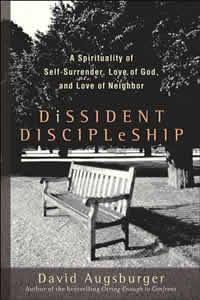David Augsburger: Dissident Discipleship
 David Augsburger, Dissident Discipleship: A Spirituality of Self-Surrender, Love of God, and Love of Neighbor (Grand Rapids: Brazos Press, 2006), 245 pages, ISBN 9781587431807.
David Augsburger, Dissident Discipleship: A Spirituality of Self-Surrender, Love of God, and Love of Neighbor (Grand Rapids: Brazos Press, 2006), 245 pages, ISBN 9781587431807.
Augsburger, an American Anabaptist author, currently professor of pastoral care and counseling at Fuller Seminary, explains that his book’s purpose is to unfold a “radical, spirituality” that he defines as “tripolar in combining love for God, others and self.” He opines that Anabaptism is “revolutionary stuff” in the present century when “spiritual passivity, collective helplessness, a sense of religious futility, and exhaustion with the disciplines of traditional spirituality have turned so many away from formal religion, church doctrine and theology”. He further considers that the Anabaptist tradition, as experienced in the Mennonite, Amish and Brethren faith communities, exceeds its spiritual contexts and appears also in Catholic, Protestant, and predominately in Charismatic and Pentecostal forms of spirituality. He views the Anabaptist alternative as having “an attitude of subversive spirituality, a stubborn set of commitments, and a radical obedience to the Sermon on the Mount” that seeks a new and closer relationship with Jesus Christ.
The author enlarges his discussion by defining the eight practices inclusive of Anabaptist spirituality: “radical attachment; stubborn loyalty, tenacious serenity; habitual humility, resolute nonviolence, concrete service, authentic witness and subversive spirituality”. It is through the understanding and practice of these disciplines that one avoids monopolar and bipolar spiritualities to practice tripolar spirituality: an inwardly directed, upwardly compliant and outwardly committed lived theology that connects “the experience of personal transformation, divine encounter (the God-ward journey) and the relation of integrity and solidarity with the neighbor”. The author explains that the unity of tripolar spirituality is essential to Jesus’ teaching on forgiveness. This spirituality is also evident in the Pentateuch, Prophets and Psalms; in the Magnificat in of Luke’s Gospel; in Paul’s epistles, and historically throughout the Middle Ages in, for example, St. Francis of Assisi, the Waldensians, and the Anabaptists of the sixteenth century.

David Augsburger is Senior Professor of Pastoral Care and Counseling at Fuller Theological Seminary.
Augsburger provides the reader with soul searching questions. For example, no longer need we ask “What would Jesus do?” but rather “What do I do with Jesus”? as I meet him in the enemy, the abandoned, the needy, the sick and the dying. He poignantly illustrates the validity of the previous question by quoting the prayer of a volunteer serving food to homeless people near the White House: “‘Lord we know you’ll be comin’ thru this line today. So help us treat you well’”.
Augsburger does well in his nuanced theological discussion of authentic community, as he contrasts the meanings of “false” versus “true” community. He opines that community is where one learns virtues, not where one chooses values. In particular he connects Gelassenhiet, defined as serenity, contentment and calmness of spirit, to the experience of fulfillment in community, through sacrifice and service, as opposed to an isolated self-actualization. Gelassenhiet combines the qualities of “fortitude and faithfulness” that lead one away from the self-serving aspects of a false spirituality.
A major strength of Augsburger’s presentation is his emphasis on the lived theology of imitation as practice: the call to mimetic behavior in following Jesus. He embraces “the politics of Jesus” which he explains as a movement downward rather than the embrace of power, influence and success. He explains dissident discipleship as the practice of reverse theology: countering the prosperity gospel and reassessing one’s present culture to compare cultural philosophy and its practices in the light of biblically-defined discipleship. He emphasizes the contrast between triumphalism versus the theology of suffering: Christ’s triumph was in and through sacrifice and suffering; the Savior’s self-giving for others. The author is careful to make a distinction in the differences between teaching religion and actually living religion. He emphasizes that “Authentic embodiment is the basis for [valid] witness.” Authentic witness is not based on the charisma of one person, or “the perfection of a particular life”, but is “the presence of a community of witnesses who verify, validate and authenticate their life together.”
Category: Living the Faith, Summer 2011


